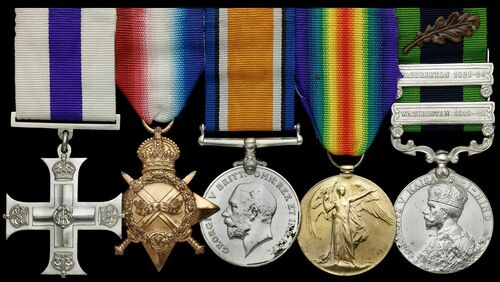
Auction: 23112 - Orders, Decorations and Medals - e-Auction
Lot: 682
(x) A remarkable Great War M.C. group of five awarded to Lieutenant-Colonel H. Stedman, 1-4 Gurkhas, who was seriously wounded during the Kuki Rebellion, while leading a daring frontal assault upon an enemy position
Military Cross, G.V.R.; 1914-15 Star (Lt. H. Stedman I.A.R.O.); British War and Victory Medals (2-Lt. H. Steadman.), note surname spelling; India General Service 1908-35, 2 clasps, Waziristan 1919-21, Waziristan 1921-24 (Capt. H. Stedman, 1-4 Grks.), with M.I.D. oak leaf, mounted as worn, sometime lacquered, contact marks, polishing, very fine (5)
M.C. London Gazette 1 January 1917.
Howard Stedman was commissioned 2nd Lieutenant with the Indian Army Reserve of Officers on 20 November 1914. Later advanced Temporary Lieutenant while holding a special appointment on 18 January 1916, likely his posting to the Judge Advocate General's Department. His actions here are not known, however he must have shown exceptional bravery as he was awarded the Military Cross at the start of 1917.
Stedman was still in India during the Kuki Rebellion, which started in December 1917 as a result of British conscription of local tribesmen for the Labour Corps. Attempts by the British Authorities to punish chiefs that refused to allow to the recruitment drive led to violence and the outbreak spiralled from there. Raids began against farms and villages all over Manipur and soon the British had no choice but to take action.
Stedman was placed in command of a column advancing from Burma toward Longya. Having burned this settlement without facing opposition he led his column towards Khailet to rendezvous with Captain Coote, the officer in command of another column. It was on this journey that he encountered a Kuki stockade and decided to make a frontal assault. This proved to be the wrong decision as the position was strongly held and the column came under a heavy fire. Colonel L. W. Shakespeare, the British officer in command in the area takes up the story in his work the History of the Assam Rifles, stating:
'He [Stedman] then descended, crossed the Manipur river and climbed to Haika en route to Khailet, where the two Columns were to have met. A very long stockade barred his path, against which Steadman [SIC] made a frontal attack and failed to take it, losing 11 killed and many wounded. Steadman [SIC], the only British officer with them, was badly wounded in three places, the carriers began to bolt, and the Column was obliged to retreat to Lenakot- a most unfortunate incident, due to inexperience of the British Officer in command.'
This makes Stedman one of only five British officers to be wounded during the campaign. After heavy fighting the uprising finally came to an end in May 1919, and although victory went to the British the difficulty with which it was earned had been noticed. As for Stedman, he was awarded the British War and Victory Medals by the Indian Government with his unit noted as the 59th Scinde Rifles (Frontier Force).
Confirmed in the rank of Lieutenant on 2 November 1918 while stationed with the 56th Punjab Rifles he was further advanced Captain on 15 August 1919. Involved in the Waziristan Campaigns between 1919-1924 he was transferred to the 4th Gurkha Rifles on 8 December 1921. Joining the Staff of the Waziristan Force on 27 August 1923 he was to serve in this position until the end of the 1921-24 campaign.
Appointed Adjutant-General Baluchistan on 25 May 1927 Stedman was promoted Major on 27 May 1937. Remaining in India during the Second World War he retired as a Lieutenant-Colonel on 12 March 1942; sold together with copied research comprising London Gazette extracts, a service record transcription and M.I.C. as well as extracts from the History of the Assam Rifles, The great Kuki rebellion of 1917-19: its real significances and The Kuki Rising 1917-1919.
Subject to 5% tax on Hammer Price in addition to 20% VAT on Buyer’s Premium.
Sold for
£2,600
Starting price
£1200




